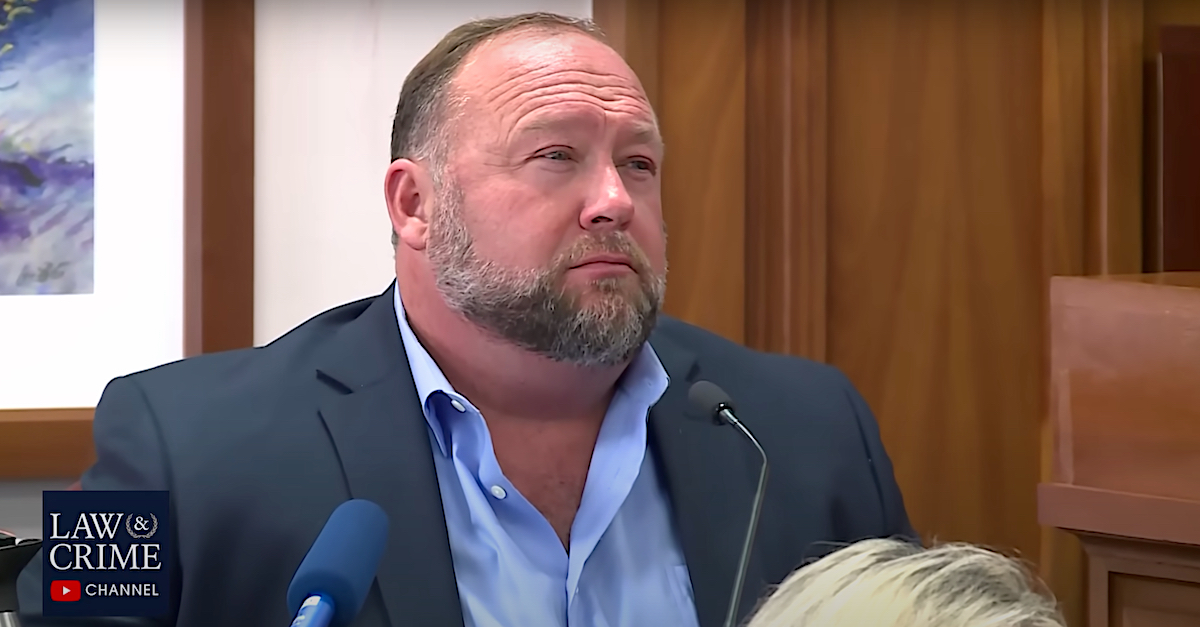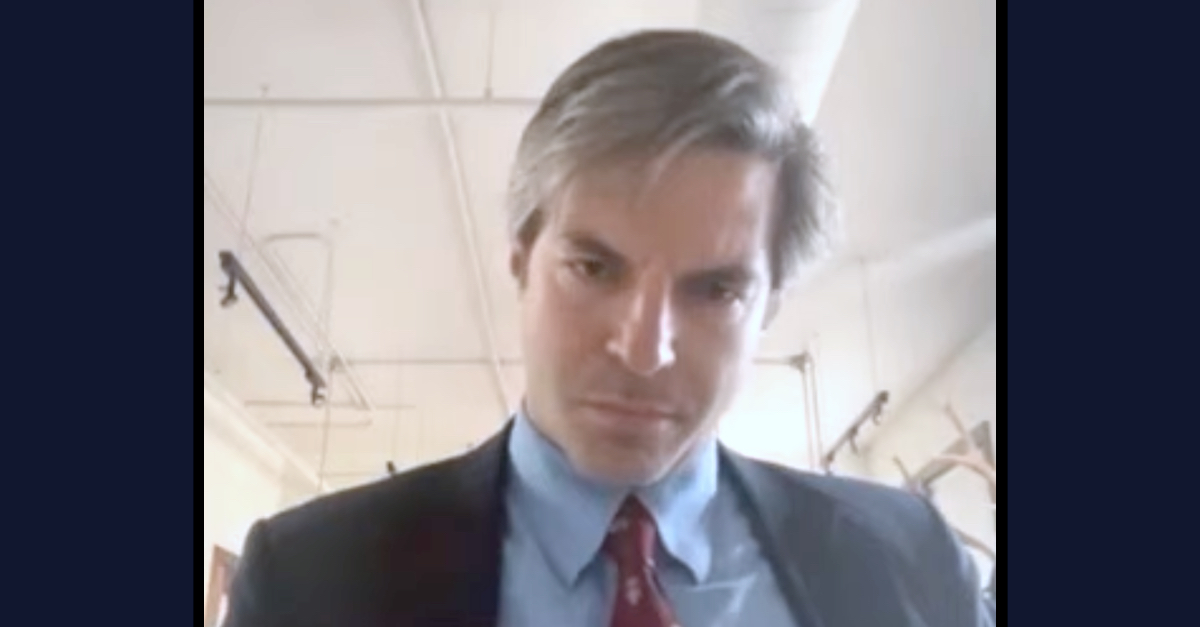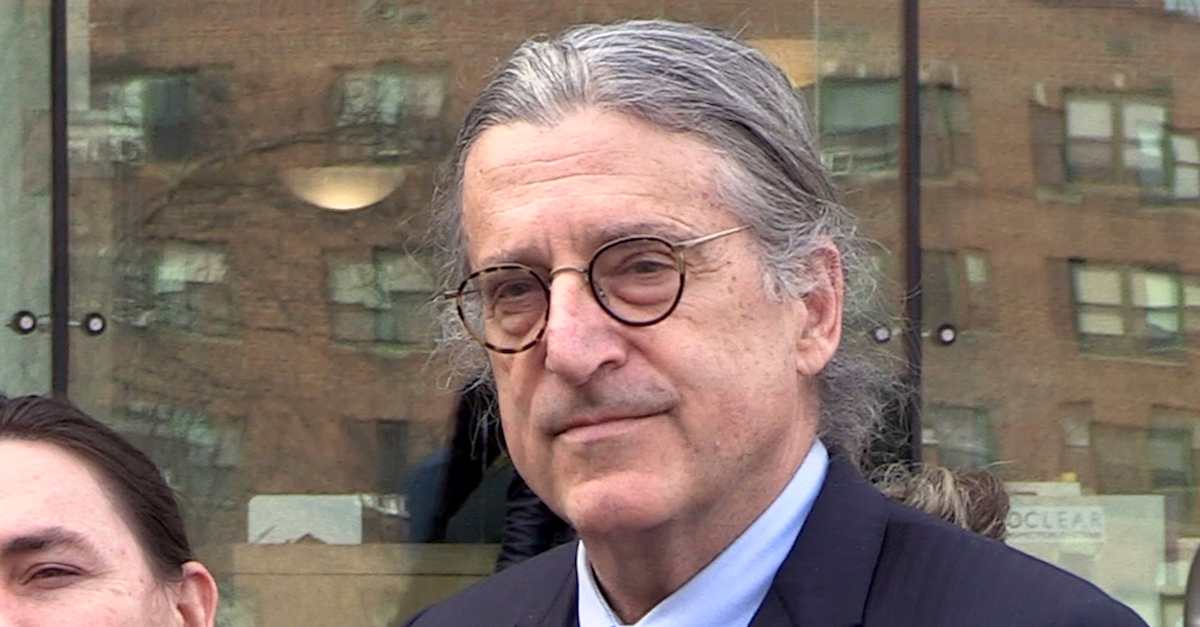
Alex Jones. (Image via the Law&Crime Channel.)
The Connecticut judge overseeing an upcoming defamation trial against Alex Jones laid out a list of ethics rules she fears two of Jones’ attorneys may have violated by allegedly disclosing the highly confidential medical and psychiatric records of plaintiffs connected to the Sandy Hook Elementary School massacre.
Superior Court Judge Barbara Bellis on Wednesday morning said the conduct of the attorneys appeared to be both “unprecedented” and “quite shocking,” but the judge made no final decisions on the record as of the time of this report as to whether or not ethics rules were, indeed, violated.
Bellis on Aug. 10 called for a hearing involving veteran Connecticut attorney Norm Pattis, who is the lead attorney representing Jones and his associated companies in the Constitution State. Two days later, she called for a similar hearing involving F. Andino Reynal of Texas, who for a time contemplated being connected to the Connecticut litigation.
Bellis explained on Aug. 10 what she sought to examine.
“It appears that the medical and/or psychiatric records of the plaintiffs in the underlying lawsuits were recently provided to unauthorized individuals,” Bellis said.
Such records had been the subject of several protective orders, Bellis reiterated on Wed., Aug. 10th and again one week later on Wed., Aug. 17.
Bellis also on both of the aforementioned dates demanded a full accounting of “who sent the records,” “when they were sent,” whether staff members transmitted the materials, the “technological expertise the sender had,” and — perhaps most importantly — exactly “what records were sent.”
“Were they medical and psychiatric records, or other records subject to the Court’s protective order?” Bellis has repeatedly asked. “I want to know exactly who received the records. And if that requires testimony from lawyers or others in the Texas case, so be it.”
Jones has been sued in both Connecticut and Texas for alleging that the Dec. 14, 2012 Sandy Hook massacre was a “hoax.” The Texas case resulted in a multi-million-dollar win for the plaintiffs.

F. Andino Reynal appeared virtually before Judge Barbara Bellis on Aug. 17, 2022. (Image via the Law&Crime Network.)
“I want to know whether any records were involved that were subject to this Court’s order,” Bellis indicated continued on Aug. 10. “This Court had entered orders regarding confidential records, highly confidential record, and attorney eyes only records. So I want evidence on what if any of the records were subject to the protective order. And I am obviously very concerned about the unauthorized release of confidential private records that were protected under the Court’s protective order. And I’m troubled that medical records that are protected under state and federal law. And psychiatric or psychological, or counseling records, which enjoy a very high level of protection under the law, might have been improperly released to unauthorized individuals.”
Bellis repeated most of those concerns in a nearly verbatim fashion during Wednesday morning’s hearing and demanded to know the “specifics on how this could have happened.”
The judge went further by noting that this is the “fourth time that counsel for the Jones defendants in this matter have been involved” with an ethics issue of some sort. Those issues, Bellis said, involved prior deposition misconduct, making “false statements,” and several issues involving the confidentiality of records.
Not all of the issues involved the two attorneys currently on the hot seat. Still, Bellis’ tone suggested that she believed both should have known better.
“This is a concern the court has raised before,” Bellis said.
Bellis ordered two dates for off-the-record hearings — dates which were not identified while the court was on the record and which will not be open to the public — to probe the issue.
She said she wanted to settle the previously cited questions about the records and to know whether certain materials were marked “confidential,” “highly confidential,” “attorney’s eyes only,” or “privileged.” She said she wanted to know “exactly what was done” and whether the materials were distributed “intentionally or unintentionally.” She also said she wanted to know the specific “details of the transmission” allegedly at issue.
“So, I don’t know yet what specific records may be involved,” the judge said. “I’m very much interested in the dates here.”
The judge’s recitation of concerns read like a list aimed to ensure no stone would be left unturned in the contemplated probe.
“The court is concerned with the possible” violations of Connecticut professional conduct rules 1.1, 3.43, 5.1(b), 5.1(c)(1) and (2), 5.3, and 8.4(4), she explained.
Bellis said she would refer the case to Connecticut’s Chief Disciplinary Counsel — who was also present — assuming such a referral turned out to be warranted. She said she did not wish to delay the scheduled start of the underlying defamation damages trial. Jury selection was supposed to have begun in early August, and an early September trial has long been scheduled. Several Jones’ affiliated companies have declared bankruptcy, however, and one of the moves — described by the plaintiffs as nothing but a stall tactic — was recently remanded back to Bellis to continue apace.
Several plaintiffs connected to the 2012 massacre sued Jones and his affiliated companies in Connecticut for defamation. Bellis entered a default judgment against the defendants after what she called a series of flagrant discovery violations.
Bellis said jury selection in a proceeding to determine the amount of damages — if any — that Jones and his companies should pay would begin on Thursday.
Reynal appeared in a remote hearing on Wednesday; Pattis’ adjacently scheduled hearing appears to have been scheduled in person.
An attorney for Reynal said he understood the seriousness of the court’s concerns.
Neither Reynal nor Pattis have responded to previous Law&Crime requests for comment about the disciplinary proceedings.
Pattis has fought against any ensuing ethics probe, however. While the case was briefly in the hands of a bankruptcy court, Pattis argued that Bellis didn’t have the authority to discipline him. He has also argued that Bellis should recuse herself from any disciplinary proceeding because, in his view, any potential ethics lapse did not “occur in the actual presence of the Court.”
Pattis also argued that his due process rights were being violated by the ethics probe.

Attorney Norm Pattis. (Image via the Law&Crime Network.)
Pattis attorney Wesley R. Mead further complained that Bellis was moving forward “based on nothing more than out-of-state press releases” and that her actions “may give rise to the public the improper impression (irrespective of its validity) that the Court has improperly chosen sides in litigation.”
The argument continued with reference to the Grievance Committee — the state’s legal ethics watchdog board — by suggesting Bellis was upset that the Committee refused to take action against previous referrals in this case.
“[T]he Judge’s statements may create an improper public perception that Attorney Pattis may end up being punished not on the merits of these allegations but based on the Judge’s discontent with the Grievance Committee’s prior determination,” Mead asserted on Pattis’ behalf. “This is especially concerning in this case as attorney discipline on Mr. Pattis may leave these particular defendants completely undefended in these actions. In the interests of public perception of Judicial integrity and impartiality it would behoove this Court to allow a different and wholly independent Judge decide the issues of attorney discipline, whether it is appropriate or not, and if appropriate following a fair and impartial hearing decide any punishment”
The filing elsewhere asserts that Pattis believes he “fully complied” with the judge’s previous protective orders.
Mead then raised the hypothetical possibility that “Pattis could have fully complied with the Confidentiality Order but still have violated a federal or state statute governing the release of medical records.” In that case, Pattis’ “defense would be premised on compliance with the Confidentiality Order,” which Mead suggested was likely faulty.
Bellis swiftly rubbished those written protestations and allowed the hearings on Wednesday to commence.